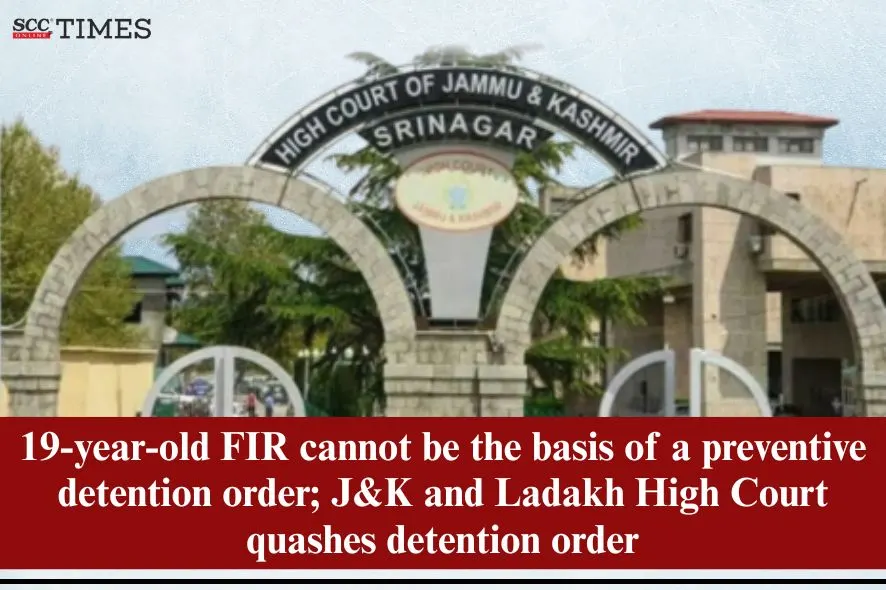Jammu & Kashmir and Ladakh High Court: In the present petition, the petitioner challenged the detention order issued by the District Magistrate (‘detaining authority’) whereby her husband (‘detenue’) was placed under preventive detention relying on an FIR lodged in 2006. There was also an unexplained delay in the execution of the detention warrant. A Single Judge Bench of M.A. Chowdhary, J., citing violation of the right to personal liberty, quashed the detention order and held that it was not permissible to pass such an order on references to the stale cases, after a period of 19 years.
Background & Contentions:
The petitioner contended that the detaining authority passed the detention order dated 6-11-2024, primarily based on an FIR registered 19 years ago in 2006 wherein the detenue was neither named nor sent for any trial. The copy of FIR was not supplied to the detenue, which prevented him from making an effective representation to the detaining authority and the order and grounds of the detention were also not explained to him. Further, there was an unexplained delay of 22 days in the execution of the detention warrant which was executed on 28-11-2024 showing that there was little to no apprehension in the minds of the respondents that the detenue could pose a threat to the public order or State security.
The respondents, however, stated that the detenue was an Over Ground Worker and was arrested in the year 2003 for his involvement in militant activities; but due to lack of evidence, he was released. However, in 2006 again an FIR was filed against him wherein it was alleged that his activities were anti-national, anti-social and prejudicial to the security and peaceful atmosphere of the area and that there was a dire need to prevent the detenue from such activities. The respondents further submitted that the whole record along with the detention order and grounds of detention were handed over to the detenue and the same were read over and explained to him in the language he understood. Regarding the contention that there was a delay in the execution of the warrant, the respondents relied on the Public Safety Act, 1978 and stated that it did not stipulate any time limit for execution of the warrant.
Analysis and Decision:
The Court observed that no cogent explanation was provided for the 22 days delay in the execution of the detention order which showed that there was no urgency for taking resort to preventive detention of the detenue. The Court referred to Sushanta Kumar Banik v. State of Tripura, 2022 SCC OnLine SC 1333, wherein the Supreme Court held that “any indifferent attitude on the part of the detaining authority or executing authority would defeat the very purpose of preventive detention and turn the detention order as a dead letter and frustrate the entire proceedings”. Further, the Court relied on Sultan Abdul Kader v. Jt. Secy. to Govt. of India, (1998) 8 SCC 343, in which the Supreme Court observed that an unexplained delay in execution of the detention order was fatal, and held that the said order was rendered unsustainable in law.
The Court cited Sama Aruna v. State of Telangana, (2018) 12 SCC 150, and observed that the criminal cases registered in the year 2003 and 2006 could not have been the basis to invoke preventive detention, as the cases had no live and proximate link with the detention order passed in 2024 after a gap of more than 19 years.
Another ground agitated on behalf of the detenue was that he was not provided with the whole material and that the contents of the detention warrant and the grounds thereof were not explained to him in the language he understood. The Court noted that though there was receipt on the record, but the copy of the FIR of the year 2006 was not provided to the detenue. Further, the Court observed that to substantiate the claims that the orders were duly explained, the respondents should have filed an affidavit by the executing officer to that effect.
The Court opined that personal liberty was one of the most cherished freedoms, and therefore, the founding fathers enacted the safeguards in Article 22 of the Constitution to limit the power of the State to detain a person without trial. In a democracy governed by the rule of law, the drastic power of detention without trial for the security of the State or public order must be strictly construed. But, where individual liberty came into conflict with the interest of the security of the State or public order, then the liberty of the individual must give way to the larger interests of the nation.
Consequently, the Court opined that the detaining authority had passed the order mechanically, in an arbitrary manner and without the application of mind and therefore, quashed the detention order directing the release of the detenue from preventive custody.
[Shakia Kouser v. State (UT of J&K), 2025 SCC OnLine J&K 709, decided on 14-7-2025]
Advocates who appeared in this case:
For the Petitioner: Rupak Ratta, Advocate.
For the Respondents: Dewakar Sharma, Dy. AG.



